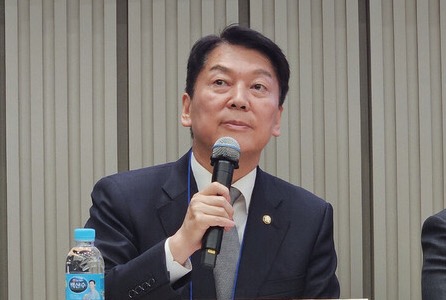Calls are mounting in the political circles for a dialogue to resolve the year-long government-doctor issue.
Instead of pressuring the medical community, the government should propose practical measures to resolve the situation and start a concrete dialog, a lawmaker said Wednesday.

“The healthcare reform, which was unilaterally pushed without preparation, has failed miserably, leaving only serious side effects,” Rep. Ahn Cheol-soo of the ruling People Power Party (PPP) said on his Facebook page. “It must end the chaos and sacrifices and rebuild the collapsed healthcare system. What's needed now is dialog and real action to resolve the situation, not deadlines and pressure on the medical community."
The doctor-turned-lawmaker emphasized that the plan to expand the number of doctors, which triggered the ongoing conflict, must be rediscussed based on scientific analysis to develop a reasonable scale, and practical measures to normalize medical education should be proposed.
The Education Ministry has said it will summarize its stance on the number of medical students for the 2026 academic year and this year's medical education in February. However, it has yet to come up with a plausible plan.
“The government made a mistake by presenting numbers without building consensus,” Rep. Ahn said. “It should have devised a reasonable (physician workforce) size through necessary discussions instead of setting many 2,000 from the beginning."
“Whether medical students who flunked by boycotting classes last year will return to school has not been decided yet. If we add these students to this year’s freshmen, there are 7,500 freshmen this year,” Ahn said. “Normal education is impossible in the current environment. It is difficult to make plans to expand faculty and invest in facilities when it is uncertain whether the enrollment quota increase will continue."
First, the government must devise concrete measures to normalize medical education. However, Rep. Ahn warned that quick fixes, such as the five-year medical school system, will only increase the problem.
He also called for the immediate withdrawal of measures to neutralize the Korean Institute of Medical Education and Evaluation (KIMEE) to ensure the quality of medical education.
“The government has pushed for an excessive expansion of medical schools while simultaneously neutralizing KIMEE, which accredits and evaluates medical education,” Ahn said. "This dangerous policy will lower the quality of medical education and allow unqualified students to be licensed as doctors. Policies that undermine the independence and autonomy of KIMEE must be reversed."
Related articles
- As government-doctor conflict enters 2nd year, calls mount for ‘cleaning up the spill’ first
- Regional public hospitals drowning in debt amid prolonged government-doctor conflict
- National university hospital’s new hires last year plunged 70% from 2022
- Unable to function properly, more emergency rooms may shut down

